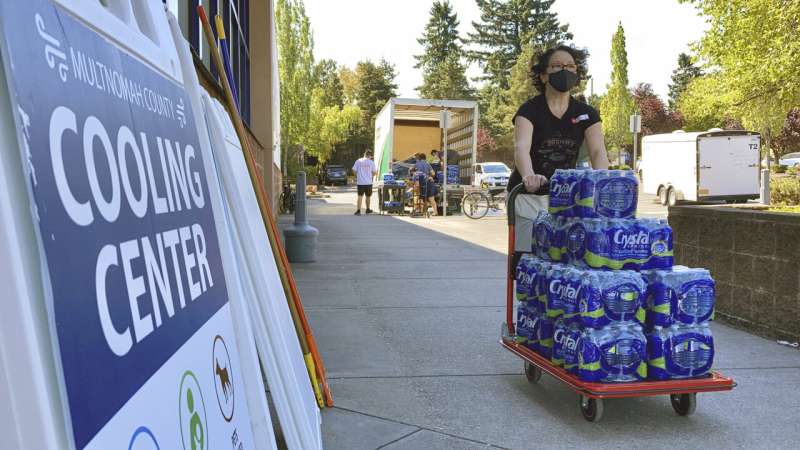Deadly US Northwest heat prompts legislation aimed at relief

As Oregon's capital city sweltered under a deadly June heat wave, Bryleigh O'Neil and three roommates were unable to afford or find air conditioners.
They spent their days seeking relief from 117-degree (47 C) temperatures in grocery stores and college classrooms. At night, the Salem housemates slept downstairs next to fans blowing over bowls of ice.
"While none of us had to go to the hospital due to heat exhaustion or heat stroke, many other Oregonians were not this lucky," O'Neil said in written testimony to the state's Legislature.
The historic heat wave killed at least 200 people in Oregon and Washington. Now, lawmakers in the Pacific Northwest are eyeing several emergency heat relief bills aimed at helping vulnerable people.
The measures would provide millions in funding for cooling systems and weather shelters during future extreme weather events.
Three consecutive days of extraordinary temperatures in the region sent public health officials scrambling between June 25 and June 28. Temperatures in Portland reached triple digits for three days, peaking at 116 F (46.7 C). In Seattle, temperatures reached a record of 108 F (42 C).
An initial scientific analysis by World Weather Attribution found that the deadly heat wave would have been virtually impossible without human-caused climate change that added a few extra degrees to the record-smashing temperatures.
In the western portion of the Pacific Northwest, summers are usually mild and air conditioning units are not as common as they are in other parts of the country.
Nationwide, about 91% of U.S. homes have primary air conditioning installed, according to data from the U.S. Census Bureau's 2019 American Housing Survey. By comparison, that figure was 78% for Portland and just 44% for Seattle.
"Most people who passed away had no access to lifesaving cooling devices such as air conditioning or heating and cooling pumps in their homes," Oriana Magnera, a manager with the environmental justice nonprofit Verde, said to Oregon lawmakers during a public hearing during the ongoing legislative session last week.
The first of Oregon's two proposed heat relief bills, both of which have received bipartisan support, would direct $5 million to the Oregon Health Authority to create an emergency distribution program that would deliver air conditioners and air filters to low-income families. It would also allocate $10 million to create an incentive program to make it easier for vulnerable households to purchase energy-efficient heat pump cooling systems.
In addition, the bill directs the Oregon Public Utility Commission to find ways of "alleviating spikes" in energy bills during extreme weather events.
During the heat wave, hospital emergency department visits for heat illness surged to more than 30 times above normal levels in Multnomah County—home to Portland.
Despite this, county officials received reports of residents who opted not to operate air conditioning units due to worry about the additional cost.
"As the frequency and severity of extreme weather increases, fear of bill spikes should not prevent people from relying on the energy they need to stay safe in place," said John Wasiutynski, the director of the Multnomah County Office of Sustainability Director.
Oregon's second heat relief bill would remove barriers for renters to install portable air conditioning units in their apartments and would require cooling systems in newly constructed rental units.
The bill would also allocate $2 million for local and tribal government to create extreme weather relief centers.
Lawmakers in two other states have also passed bills focused on expanding and opening cooling shelters in the past three years. In 2019, California lawmakers passed a bill that allows the adjutant general to utilize vacant armories as temporary cooling shelters for homeless people. In 2021, lawmakers in Illinois passed a measure calling for space to be set aside in communities for use as cooling shelters in extreme heat emergencies.
In Washington, lawmakers explored a bill that would have expanded the use of air conditioning in senior care homes. However, the measure didn't make a legislative cutoff and likely won't proceed this session unless lawmakers decide to add it as an element to the state budget in the coming weeks.
Washington's proposed bill would have allocated $5 million to establish a grant program in the Department of Social and Health Services to ensure air conditioning is provided in adult family homes.
"I know lots of homes here in the Pacific Northwest don't have air conditioning, and most of the year we don't need it," Sen. Mark Mullet, a Democrat from Issaquah who sponsored the bill, said in a written statement introducing the bill. "But our swings in weather are getting more extreme, and nowadays a lack of air conditioning can be fatal."
© 2022 The Associated Press. All rights reserved. This material may not be published, broadcast, rewritten or redistributed without permission.





















